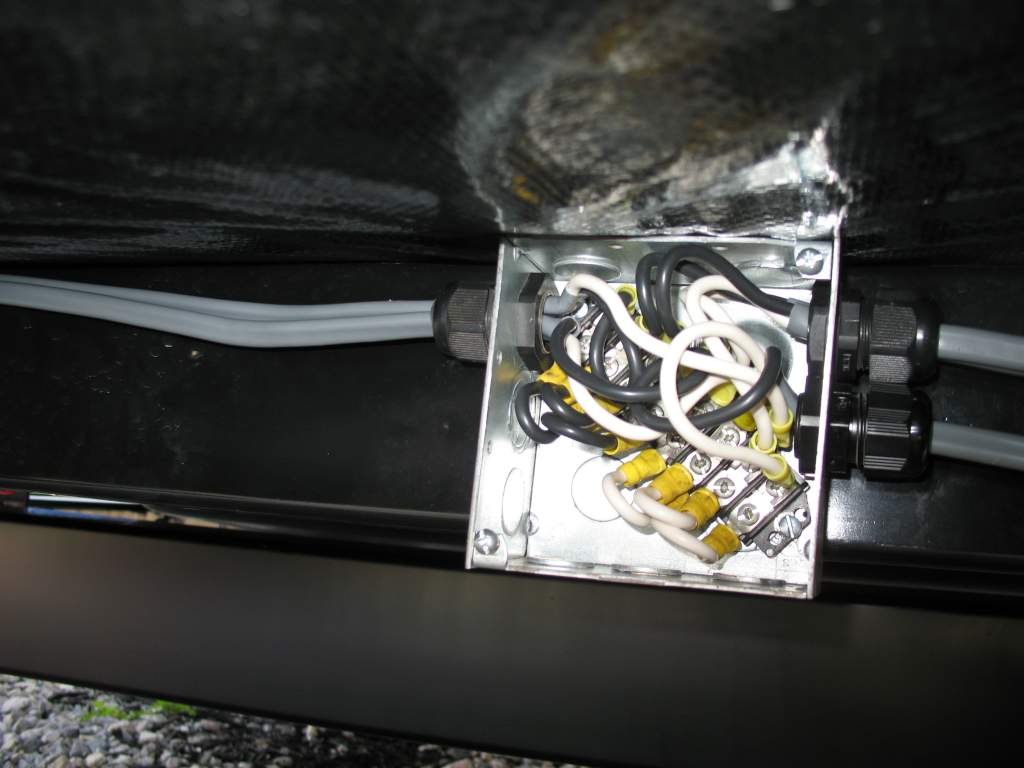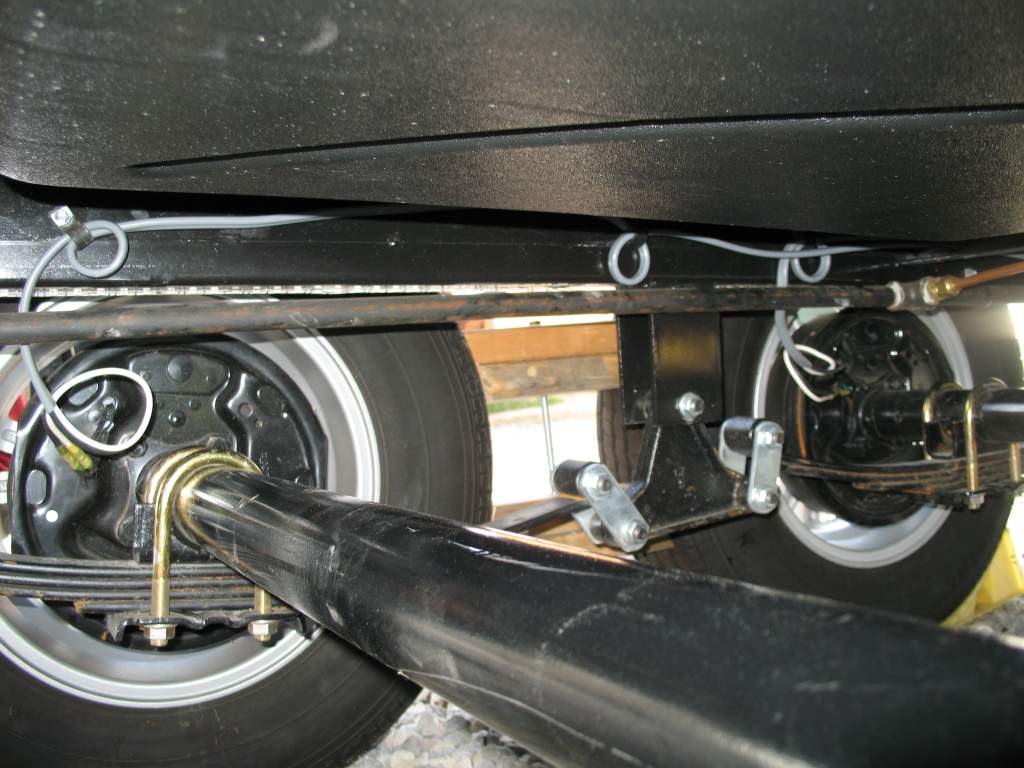- Good Sam Community
- Everything RV
- Technical Issues
- Re: Brake issues resolved....but.....
- Subscribe to RSS Feed
- Mark Topic as New
- Mark Topic as Read
- Float this Topic for Current User
- Bookmark
- Subscribe
- Mute
- Printer Friendly Page
Brake issues resolved....but.....
- Mark as New
- Bookmark
- Subscribe
- Mute
- Subscribe to RSS Feed
- Permalink
- Report Inappropriate Content
Sep-23-2015 06:42 PM
I replaced the wires from the Pinbox connection to the brakes. I decided to use 12 gauge wire which is a step up from the wimpy wire that was original. I considered 10 gauge wire which has been used by some, but decided to use 12 gauge. Hope it's enough. I ensured that all connections were very good and I used waterproof boxes under the trailer to house most of the interconnections for the main brake line wires. Brakes work very well now.
My question now is:
Having increased the wire gauge of the trailer harness, I have now noticed that my 2003 Dodge Ram 2500 with tow package has much smaller wires from the controller (Prodigy P2) to the 7 pin connector at the back of the truck. Not sure of the gauge, but they look much smaller than 12 gauge. Looks like the blue wire which is the actual brake command should be larger.
Should I also increase the size of the blue wire from the 7 pin connector at the rear of the truck all the way to the controller? Would that improve braking even more? Anybody done that?
- Mark as New
- Bookmark
- Subscribe
- Mute
- Subscribe to RSS Feed
- Permalink
- Report Inappropriate Content
Sep-25-2015 02:06 PM
Coolerman wrote:
OK here is the finished wiring shots:
J-Box with terminal strip...
Left side brake wiring...
Old system voltage (truck running) at right rear brake magnet (furthest from TV connector) was 12.9. With new wiring 13.4 enough difference to make it worth while in my opinion...
I did similar to yours with the junctions boxes. Used outdoor boxes with gaskets to seal up the boxes I didn't use terminal strips however. Wish I had. I just used wire nuts. I did use underground sprinkler wire nuts which are made for wet environments. They have a silicone(I think) stuff in the wire nuts which eliminates moisture.
Still need to check voltages like you did. Brakes work very well though.
I really like the way you looped the wires to allow for suspension movement. I may redo mine the same way. Seems like it would probably work better.
- Mark as New
- Bookmark
- Subscribe
- Mute
- Subscribe to RSS Feed
- Permalink
- Report Inappropriate Content
Sep-25-2015 08:58 AM
J-Box with terminal strip...

Left side brake wiring...

Old system voltage (truck running) at right rear brake magnet (furthest from TV connector) was 12.9. With new wiring 13.4 enough difference to make it worth while in my opinion...
2016 Venture Sonic 170VBH
SOLD:2001 StarCraft Gemini
TV: 2018 Ford F-150 Lariat
- Mark as New
- Bookmark
- Subscribe
- Mute
- Subscribe to RSS Feed
- Permalink
- Report Inappropriate Content
Sep-25-2015 08:34 AM
MEXICOWANDERER wrote:
- There is conductivity, the amount of current the wire can carry
- There is MECHANICAL STRENGTH, which decides when and if the wire will fail structurally
- I use TTMA (Truck Trailer Manufacturer's Association) 7-way trailer cord sheathed in it's own neoprene jacket to run to the rear of my vehicles
- Ahead of the trailer connector socket I drop a 1/4" by 1" hanger
- A 4" cap of triple wall heat-shrink tubing collars the neoprene sheath
- Then a stainless-steel cable tie wrap clamps the cable to the hanger
- This is via the school of hard-knocks the only way I have stopped ice accumulations from yanking the trailer cord wire ends from the socket
I never thought about ice building up under our camper. Living in Florida we don't worry about that sort of thing, but we traveled to Colorado a couple of years ago, and it could have been a factor when we visited Crested Butte and encountered a good bit of snow and ice.
I think I will take your advice in wire choice and attachment.
- Mark as New
- Bookmark
- Subscribe
- Mute
- Subscribe to RSS Feed
- Permalink
- Report Inappropriate Content
Sep-24-2015 02:20 PM
Coolerman wrote:
I'm working on "upgrading" the wiring on my brand new camper that has not even been on a single trip yet! It came from the factory with 14ga wire in the pigtail to a J-box, 12 gauge from the J-box back to the left brakes and 16ga from the left brake to the right brakes. Wire nuts in the J-box and IDC connectors to tie to the brake magnets. Total disaster waiting to happen when you also take into account they routed the 16 ga wires over top of the gas line and left NO slack in them for suspension movement! When I got home from the dealer (150 miles of towing) the insulation had already worn half off the wires! I am replacing ALL wire from the main J-box back to another J-Box 4' behind it with 10/2 ga wire. Inside the second J-box will be a 8 position terminal strip where I will attach 4 10/2 wires one to each magnet. I will make small coils at each brake to allow for suspension movement. Pic of the current wiring. I will post pics of the finished project tomorrow.
Great work.
I sure wish I had installed terminal strips in my Junction boxes. Sure would make it easier to disconnect to troubleshoot future problems. Maybe after I've rested for a month or two, I might add them. Lol. Gettin Old is no fun. Not for sissys as they say.
- Mark as New
- Bookmark
- Subscribe
- Mute
- Subscribe to RSS Feed
- Permalink
- Report Inappropriate Content
Sep-24-2015 01:38 PM
- Mark as New
- Bookmark
- Subscribe
- Mute
- Subscribe to RSS Feed
- Permalink
- Report Inappropriate Content
Sep-24-2015 12:20 PM
- There is conductivity, the amount of current the wire can carry
- There is MECHANICAL STRENGTH, which decides when and if the wire will fail structurally
- I use TTMA (Truck Trailer Manufacturer's Association) 7-way trailer cord sheathed in it's own neoprene jacket to run to the rear of my vehicles
- Ahead of the trailer connector socket I drop a 1/4" by 1" hanger
- A 4" cap of triple wall heat-shrink tubing collars the neoprene sheath
- Then a stainless-steel cable tie wrap clamps the cable to the hanger
- This is via the school of hard-knocks the only way I have stopped ice accumulations from yanking the trailer cord wire ends from the socket
- Mark as New
- Bookmark
- Subscribe
- Mute
- Subscribe to RSS Feed
- Permalink
- Report Inappropriate Content
Sep-24-2015 11:55 AM

2016 Venture Sonic 170VBH
SOLD:2001 StarCraft Gemini
TV: 2018 Ford F-150 Lariat
- Mark as New
- Bookmark
- Subscribe
- Mute
- Subscribe to RSS Feed
- Permalink
- Report Inappropriate Content
Sep-24-2015 10:51 AM
westend wrote:
FWIW, I replaced the daisy chain brake wiring on my trailer with 14 ga. in a star configuration. I chose to have both the ground and positive phase installed in conduit to a termination strip on the tongue (enclosed). That is one pair of wires for each brake plate. My brakes work fine and it is easy to diagnose an electrical fault.
Any gauge wire 16 AWG or larger will handle the current to engage 4 brakes. 16 ga will have more voltage drop than 12 or 10. You will need to decide how much voltage drop is going to affect your brake system. I would suggest that replacing the shoes or adjusting them will bring 100 times better results than increasing a 15' wire to a larger gauge.
Very good idea with the individual wires for each magnet to aid in troubleshooting. I should have done that when I rewired mine, but maybe the way I have done it, will be ok for troubleshooting any future issues. I will just have to crawl under the camper.
I did replace all the brake assemblies when I corrected the wiring short. The assemblies have the magnets as well as shoes and all mechanical parts, and I adjusted the brakes properly. I'm very happy with the performance of the brakes at this point. I just wondered if a larger blue wire from the controller would improve it any, considering my rig is a fifth wheel that is about 10k gvwr.....more or less. I haven't checked the voltage that is delivered from the controller since replacing the wires. Will put that on my to do list. I do know that with the controller (Prodigy P2) set to about 10 volts and gain set to b3 .....the rig stops very well.
- Mark as New
- Bookmark
- Subscribe
- Mute
- Subscribe to RSS Feed
- Permalink
- Report Inappropriate Content
Sep-24-2015 07:29 AM
Any gauge wire 16 AWG or larger will handle the current to engage 4 brakes. 16 ga will have more voltage drop than 12 or 10. You will need to decide how much voltage drop is going to affect your brake system. I would suggest that replacing the shoes or adjusting them will bring 100 times better results than increasing a 15' wire to a larger gauge.
'71 Starcraft Wanderstar -- The Cowboy/Hilton
- Mark as New
- Bookmark
- Subscribe
- Mute
- Subscribe to RSS Feed
- Permalink
- Report Inappropriate Content
Sep-24-2015 07:16 AM
- Mark as New
- Bookmark
- Subscribe
- Mute
- Subscribe to RSS Feed
- Permalink
- Report Inappropriate Content
Sep-24-2015 05:19 AM
TucsonJim wrote:
The wire size is dictated by the current flowing through the wire. If Prodigy elected to go with a 14ga wire, there is no need to go with a larger gauge further down-stream.
Makes sense to me, but why does etrailer recommend 10 gauge for brake wiring on the trailer/rv?
- Mark as New
- Bookmark
- Subscribe
- Mute
- Subscribe to RSS Feed
- Permalink
- Report Inappropriate Content
Sep-23-2015 09:07 PM
2017 Grand Design Reflection 297RSTS
2013 Ford F350 Turbo Diesel SRW 4x4 (Destroyed by fire - 8/29/16)
2014 Grand Design Reflection 337RLS (Destroyed by fire - 8/29/16)





